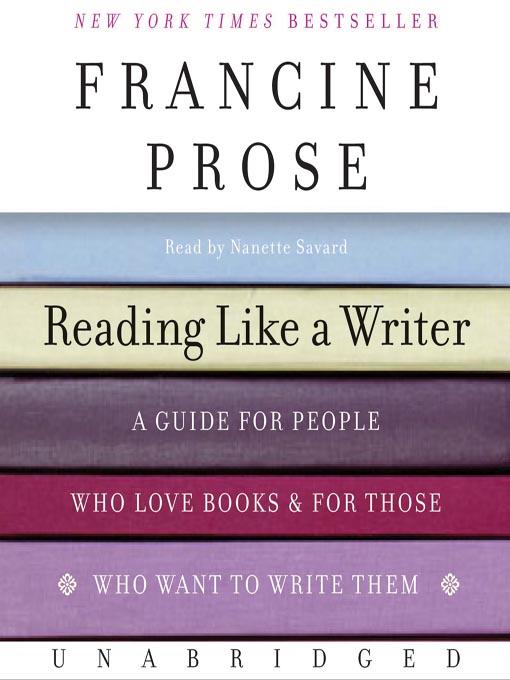
Reading Like a Writer
A Guide for People Who Love Books and for Those Who Want to Write Them
کتاب های مرتبط
- اطلاعات
- نقد و بررسی
- دیدگاه کاربران
نقد و بررسی

Reader Nanette Savard meets every requirement of this nonfiction work by novelist and critic Francine Prose. Savard's voice captures the author's tone of authority as she sets forth her dual mission: "to help passionate readers and would-be writers understand how a writer reads." Savard's crisp syllables highlight Prose's literary analysis, and her rhythms project Prose's love of language. Personal anecdotes from Prose include her reflections on a twelfth-grade teacher who taught her "close reading," a formative practice that changed her forever. Plenty of literary excerpts are included--Savard's pauses eloquently capture Prose's thoughtful quality as she discusses them. S.W. (c) AudioFile 2007, Portland, Maine

Starred review from April 24, 2006
The trick to writing, Prose writes, is reading—carefully, deliberately and slowly. While this might seem like a no-brainer, Prose (Blue Angel
; A Changed Man
) masterfully meditates on how quality reading informs great writing, which will warm the cold, jaded hearts of even the most frustrated, unappreciated and unpublished writers. Chapters treat the nuts and bolts of writing (words, sentences, paragraphs) as well as issues of craft (narration, character, dialogue), all of which Prose discusses using story or novel excerpts. This is where the book truly shines; Prose is remarkably egalitarian in choosing exemplars of fiction: David Gates, Denis Johnson, John le Carré and ZZ Packer, for instance, are considered as seriously as Chekhov, Melville, Flaubert or Babel. Prose insists that "literature not only breaks the rules, but makes us realize that there are none
," and urges writers to re-read the classics (Chekhov, especially) and view "reading as something that might move or delight you." Prose's guide to reading and writing belongs on every writer's bookshelf alongside E.M. Forster's Aspects of the Novel
.

July 30, 2007
Savard has a pleasant voice, a good vocal range and the important ability to emphasize for clarity and drama. She's especially good at the long and very varied quotes Prose has selected to illustrate the elements of “close reading,” i.e., paying careful attention to words, sentences, paragraphs, narration, character, dialogue, details and gesture (her chapter headings). Prose has taught writing classes for more than 20 years and published 14 books. To be a good writer—or a good reader—she argues, you must develop the ability to focus on language and explore line by line how the best writers use each element of language to create unique and powerful people and stories. She pulls out words and phrases from various authors to show us, for example, precisely how Flannery O'Connor creates “the literary equivalent of a fireworks display” while Alice Munro “writes with the simplicity and beauty of a Shaker box.” This is a an excellent listen that belongs in any reader's or writer's library next to Strunk and White's The Elements of Style
. Simultaneous release with the Harper Perennial paperback (Reviews, Apr. 24, 2006).

August 1, 2006
Adult/High School -Life is precious, and much of that preciousness lies in the details: the sights, the sounds, the scents we too often ignore in our busy lives. Prose makes a superb application of that concept for readers of fiction. To know how the great writers create their magic, one needs to engage in a close reading of the masters, for that is precisely what successful writers have done for thousands of years. College programs in creative writing and summer workshops serve a purpose, but they can never replace a careful reading of the likes of Austen, Dostoyevsky, Flaubert, Kafka, Salinger, Tolstoy, and Woolf. In this excellent guide, Prose explains exactly what she means by -close reading, - drawing attention to the brick and mortar of outstanding narratives: words, sentences, paragraphs, character, dialogue, details, and more. In the process, she does no less than escort readers to a heightened level of appreciation of great literature. Many will want to go to the shelves to read again, or for the first time, the books she discusses. And to aid them, she thoughtfully adds a list at the end: -Books to Be Read Immediately. -" -Robert Saunderson, Berkeley Public Library, CA"
Copyright 2006 School Library Journal, LLC Used with permission.

June 15, 2006
Prose, known for her novels (e.g., "Blue Angel"), as well as her nonfiction (e.g., "Caravaggio: " "Painter of Miracles"), presents a short volume that serves as literary criticism, as a writing guide, and as an ode to the value of careful reading. Prose devotes a chapter each to eight elements of writing: words, sentences, paragraphs, narration, character, dialog, details, and gesture. These chapters are framed by an opening piece that urges close reading as most productive for writers; a chapter devoted to Chekhov, particularly his short stories, as translated by Constance Garnett; and a closing chapter, -Reading for Courage. - Throughout, Prose focuses on what makes great fiction, mixing personal narrative with plentiful quotations from her favored writers, including both the big names generally encountered in such books (Joyce, Woolf, Mansfield, Flannery O'Connor, Melville, Austen, Paul Bowles, and Raymond Carver) and writers like Tatyana Tolstaya, Paula Fox, and Rex Stout. As the title suggests, this book is likely to find its audience with readers who are also writers or who long to be. Those who simply -love books - but do not have interest in the excruciating process behind their creation will not find the same value here. As a result, this book may have a narrow audience but one that will find much to enjoy. Prose also includes a suggested reading list. Recommended for academic and large public libraries." -Stacey Brownlie, Lititz P.L., PA"
Copyright 2006 Library Journal, LLC Used with permission.

























دیدگاه کاربران